If you have ever been the owner of more than one cat, you probably know that cats that share their living space tend to take care of each other.
Even if they don’t get along too well, they might try to lick and groom each other every once in a while.
This is called ‘allogrooming’, something which is defined as “social grooming between members of the same species”.
Domestic cat allogrooming happens as a result of dominance display.
You might think that submissive cats know who’s in charge and will want to groom their ‘boss’, but this is not true.
Dominant cats groom the submissive ones, so the latter has a higher chance to be on the receiving end of allogrooming.
Contents
Interesting facts about allogrooming in domestic cats
Now that you know the most likely reason why cats groom each other, let’s look at several fascinating facts about this behaviour.
Not all cats want to groom their buddies, and it can happen only in some situations.
1. Cats that are friends are more likely to groom each other
If you are looking into getting a new cat and expecting your older one to start grooming the new feline member of your family right away, you are in the wrong.
Allogrooming happens in cats that already know each other well.
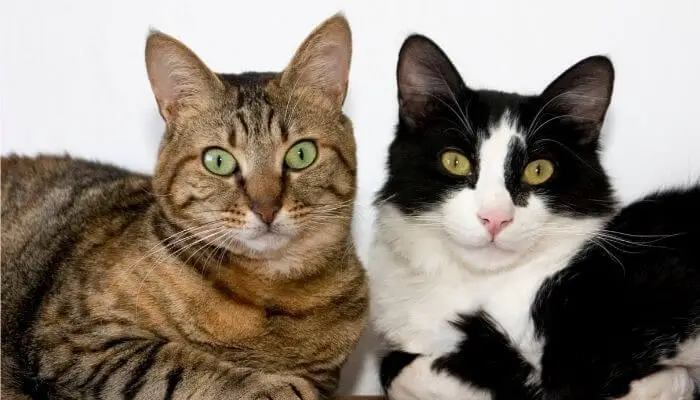
This means that only after the older cat has spent at least several weeks in the company of the new one will you see them grooming each other.
Sometimes, if they never become friends or get used to living in the same space, they might groom each other only on occasion and only to reinforce their dominance.
2. If two cats groom each other, one gives more, and the other gives less
This doesn’t necessarily happen every time, but it’s quite common for cat owners to notice that one of the cats seems to be more eager to groom the other one.
The cat at the receiving end of the allogrooming behaviour can, of course, begin to reciprocate.
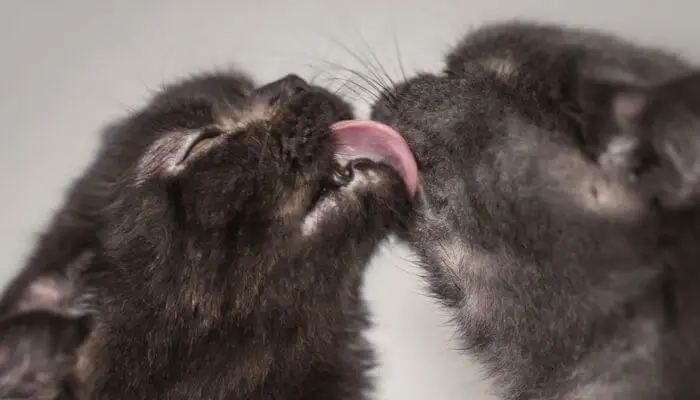
However, if this occurs as a result of dominance, it is not unusual for you to see that the one doing the grooming might even try to re-position the one being groomed so as to better clean her body.
If the cat being groomed does not comply, the groomer (the dominant one) might become aggressive and hiss or try to bite the submissive one until she stays put and accepts the grooming.
3. Allogrooming is present in both indoor and outdoor cats
As you might imagine, allogrooming doesn’t occur only in domesticated cats.
In fact, it is a behaviour exhibited by wild cats, too.
Researchers from the University of Georgia found that even in free-roaming cat colonies, allogrooming is quite a common behaviour.
It is more likely to happen in cats that have already established a social bond.
Cats that aren’t a member of the colony or are in the process of being accepted by the rest do not receive any grooming from the other cats.
Even though domesticated cats don’t live by the same dominance and submission rules that are still very present in wild colonies, they still retain some of the behaviours.
For example, if you take your cat to a friend’s house and they also have a cat, it’s quite unlikely for the two to start grooming each other during the time they spend together.
They will want to get to know each other, without a doubt, but they’ll do that by smelling their bodies and paying attention to each other’s behaviours.
If they are young, they might be friendlier and even be willing to play with each other.
4. Allogrooming happens regardless of the cat’s age or gender
People tend to think that this behaviour is more common in geriatric cats or those that have been neutered or spayed.
While it might be true that cats that are intact are less interested in grooming other cats for the simple reason that they want to tend to their business and reproduce as much as possible, when they are not in heat, they’re just as likely to accept and give grooming from and to other cats.
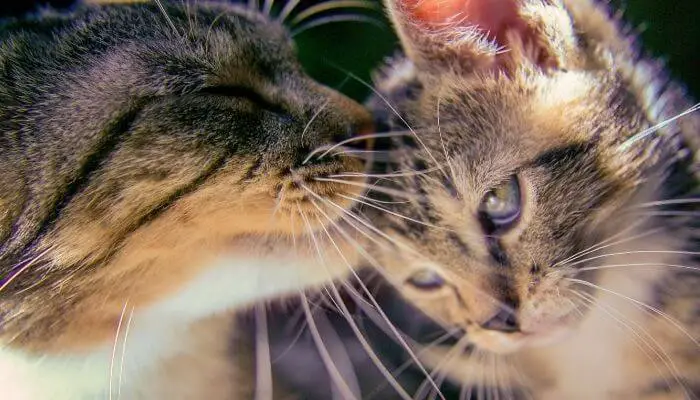
Spaying and neutering your feline friend does eliminate the possibility of your cat developing certain medical conditions and does calm them down to an extent.
But the procedure and the hormonal changes in a cat’s body don’t necessarily make him/her more or less prone to allogrooming or not.
As for geriatric cats, the matter’s a bit complicated there.
If they remain the dominant ones in a household forever, they will be the ones doing the grooming.
If, on the other hand, the balance of dominance changes and they end up being submissive to another cat, they will have to accept grooming rather than giving it.
5. Some body areas are more likely to be groomed by a different cat
Cats don’t begin to groom another cat with a plan in mind.
But sometimes, cat parents can see one of the cats asking for grooming on purpose, such as going to the other one and rubbing her head and neck against her body, especially if she’s already grooming her own body.
More often than not, cats that want to be groomed ask for it, but they also try to guide the one grooming them so that they clean some hard-to-reach places such as the back of their necks, for example.
6. Allogrooming makes cats feel comfortable
This goes without saying, but allogrooming isn’t uncomfortable at all.
Besides, cats are known to be very independent, so when they have had enough of being groomed by a feline friend, they can just leave.
Allogrooming can also relate to a maternal instinct. As you know, queens clean their kittens right after having given birth to them.
This makes it possible for the kittens and mother to mark each other with their scent, but it also has another practical dimension.
It gets rid of the smells that are characteristic of the birth process, which means that predators are going to be less likely to discover and attack the mother and the babies.
Kittens are also groomed as they grow by their mothers, so this is a behaviour that she teaches them.
So not only is grooming each other hygienic, but it also makes them feel comfortable as it reminds them of their moms.
Do cats groom other animals?
Yes.
As strange as it might seem, cats that become well-acquainted with another animal will want to groom it, too.
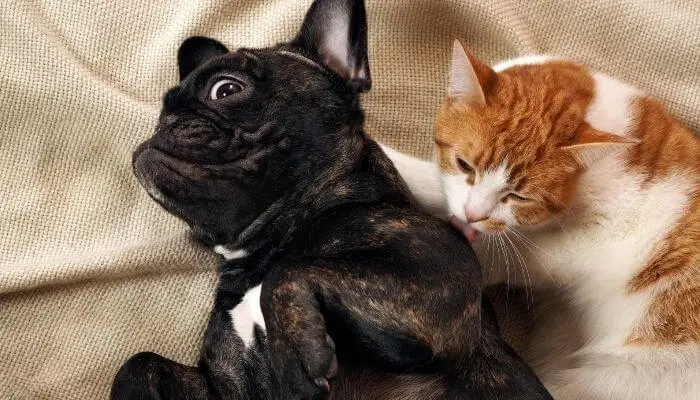
Whether it is a result of habit and feeling at ease around that pet or an attempt to dominate it, grooming other furry friends is quite common.
The internet is filled with videos of cats grooming their canine buddies.
Some cats have even become friends with ferrets and other critters and have exhibited grooming behaviours toward these species, too.
Why do cats groom each other and then fight?
There are several possible explanations for this type of behaviour.
If the submissive cat no longer wants to accept grooming from the dominant one, the latter is going to try to hold her in position for as long as possible.
At one point, she might lose her patience, so she’ll try to get the cat to stay still by nipping or lightly scratching her.
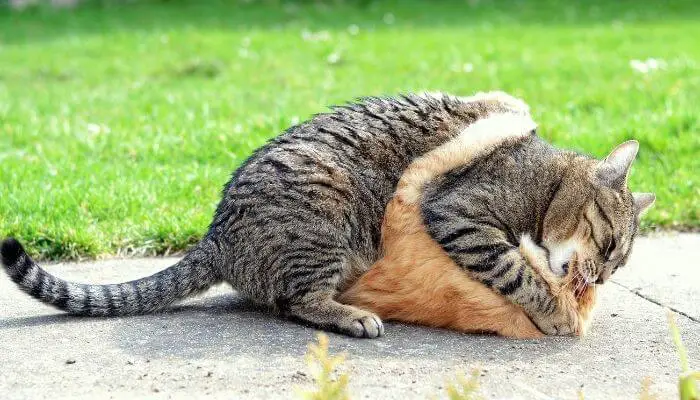
But usually, this will not lead to real aggression, especially in two cats that have lived with each other for a long time and that otherwise get along perfectly fine.
Another reason they might start fighting is that they can sometimes react differently to some stimuli, and they could just as well get scared.
This is especially true for cats that are constantly anxious, and that can be frightened by most anything in their living environment.
Some cats might look like they attack each other, but they might want to play.
This is very common as cats tend to get bored easily when being groomed by their owners or by another cat.
Conclusion
Allogrooming is a perfectly natural behaviour of cats that share the same living space.
Free-roaming cats groom each other just as much as indoor-only ones do, especially if they are a part of the same colony.
Allogrooming does not usually occur for hygiene reasons.
However, some cats might ask their feline friends to groom some of their hard-to-reach body areas that they otherwise can’t properly groom by themselves.
In general, cats that groom each other get along well or are aware of and respect a dominance and submission dynamic that makes things work between them.
Dominant cats are more likely to groom submissive ones than the other way around.
As an Amazon Associate I may earn a small fee from qualifying purchases at no extra cost to you. This helps us run the site, so thanks for your support!

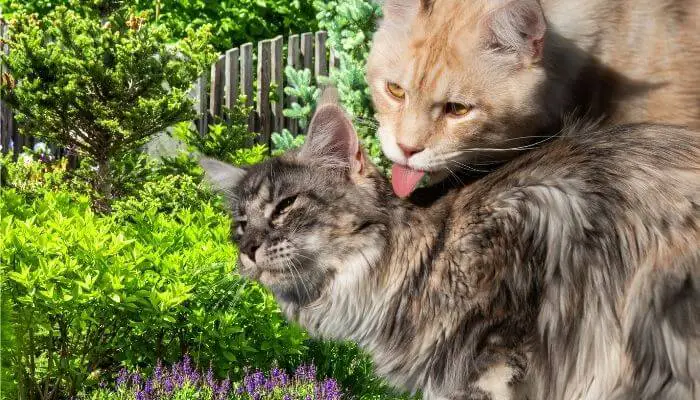
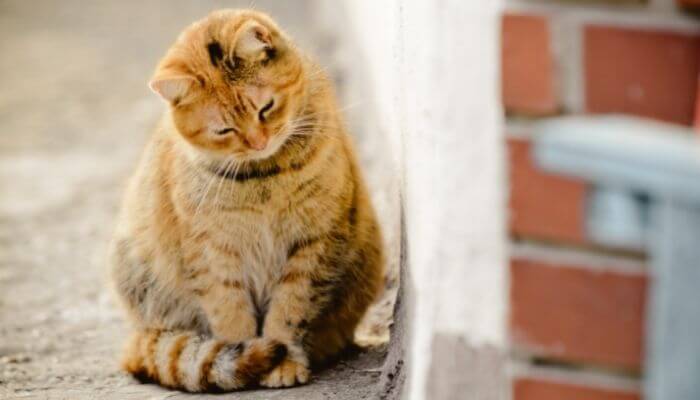
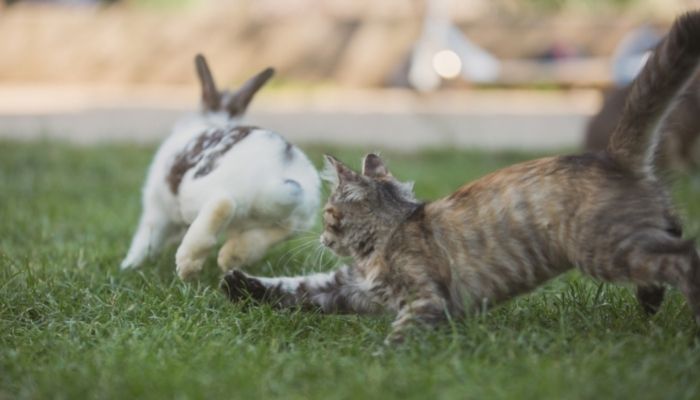
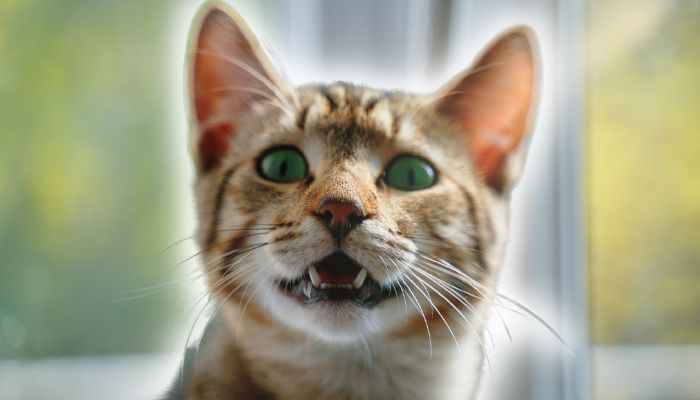
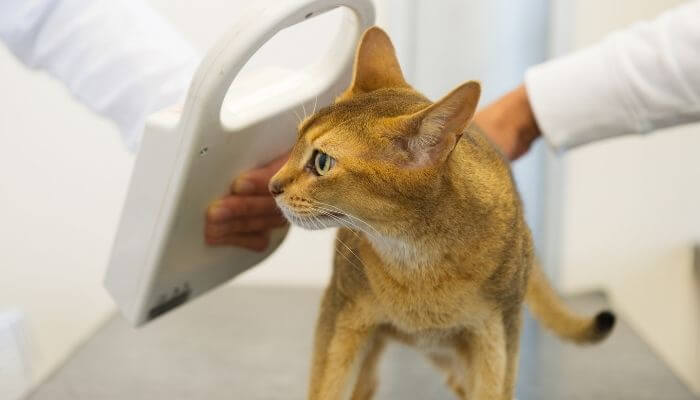
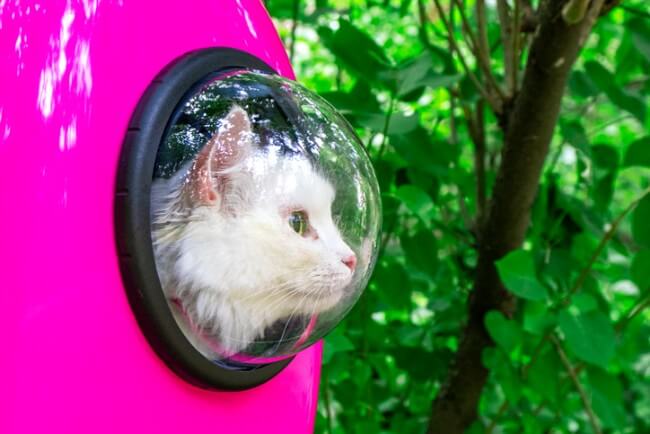
Leave a Comment